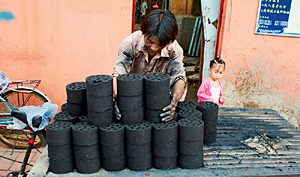In the small streets of Beijing is is very common to see bike-trucks loaded with coal briquettes, especially when the heating season starts. These briquettes fits nicely into the small stoves in the hutongs and has been the prime source of energy for heating and cooking for the households in Beijing. But the coal burning is contributing to the heavy air pollution in Beijing and the Beijing government thus wants to reduce the use of the briquettes.
Since 2003 (after a pilot period from 2001) the government has supported a program for installing electricity for heating and cooking in inner Beijing. In 2012 21,000 households will get rid of the coal stove which brings the total number of households switching from coal to electricity to more than 200,000 since the beginning of the program. The households receive a subsidy to the electricity price in the night time in order to make it able to compete with the cheap coal. See the information from NDRC here (in Chinese)
The massive amount of cars in Beijing are often blamed for the air pollution. But actually the coal consumption is a worse polluter. Of course the coal fired coal plants in the Beijing area are big sinners but also these small stoves which leads the pollution directly into the streets and houses are very unhealthy – like the London smog years ago, that mainly was created by small coal stoves. So this program is definitely a step in the right direction for the whitings. In other areas in Beijing district heating is a more sustainable solution. Beijing has Chinas largest district heating company, Beijing District Heating Group which has extensive cooperation with international companies including Danish companies e.g. as part of the energy cooperation between the City of Copenhagen and the City of Beijing. One of the challenging issues regarding district heating is to change the payment from an area-based payment to a payment based on actual consumption. This is needed in the process of enhancing energy efficiency but requires installation of meters and a new set-up of accounting – a long-term process.
Beijing District Heating Group owns some of the power plants in the Beijing area, delivering heat to the district heating system. And the power plants does not only contribute to the local pollution but also to the global CO2 emission. If you want to monitor the emission of CO2 from power plants in Beijing (or other places in the world) have a look at the Carma website. I haven’t checked the accuracy of the Chinese data, but the web site in it self look interesting. As mentioned in an earlier blog, Beijing is about to change the coal fired power plants into natural gas fired plants before 2015, and this should of course be reflected on the web site when the changes happens.
The Beijing air-pollution is still a major problem for people living in the city. But the steps taken are all steps in the right direction – and I would say, the steps are more than needed!

